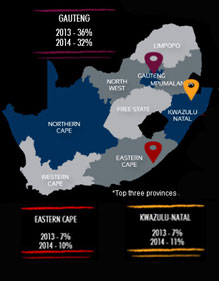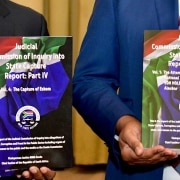|
Getting your Trinity Audio player ready...
|
 Corruption Watch has undertaken a number of activities in the first part of the year to further encourage the public to join the fight against corruption. The response has been positive leading to an increase in the number of complaints reported to the organisation.
Corruption Watch has undertaken a number of activities in the first part of the year to further encourage the public to join the fight against corruption. The response has been positive leading to an increase in the number of complaints reported to the organisation.
In the first five months of the year we investigated several of the complaints, extended our digital reach to enable easier access to our reporting lines, appeared in court in support of a case, went to Parliament, published our second annual report, continued our radio coverage and made our television début, released a new animated video, grew the number of reports we received, and more.
One of the highlights of the first five months was the release on the national broadcaster of our first television advert. It carried the theme Our future is not for sale, and aimed at encouraging the public to resist corruption. The advert featured Corruption Watch staff making their small screen debut doing all the things they fight against every day. It flighted for a month between February and March on public broadcast channels and with over 7 000 views on YouTube to date, has proved to be popular on social media as well.
Hot on the heels of the advert came the second Corruption Watch annual report, which was initially made available online only, and later in print form. It coincided with the launch of Corruption Watch Connected, our new online community platform which uses social networking features to share information and mobilise people to fight corruption.
Our other foray into the digital space was the launch in February of a Mxit app called CorruptionWatchconnect, which is targeted at its mostly youthful users and encourages them to become more aware of, discuss, and report corruption in their environments.
Two important ongoing areas of focus are the arms deal commission which is probing allegations of corruption, and the Nkandla scandal, which revolves around the excessive use of public money. Election coverage in the months leading up to 7 May was also of significance.
As part of our public education efforts, we released three downloadable and shareable e-books, one on whistleblowers, one on procurement corruption, and one focusing on schools – with more to come.
Also on the public education front, a new animated video featuring Bra Tjotjo – the scheming scoundrel who never misses an opportunity to line his pockets – was released in May. In this episode the crafty Tjotjo gets involved in a lucrative construction project that involves a high-ranking government official.
Reports keep on coming in
An analysis of our volume of reports received in the first five months of 2014 reveals that it has increased substantially, when compared to the same period last year.
We received 827 reports between January and May 2013, and the number for 2014 was 1 294 – a 56% increase. Although the April period, with its many school and public holidays, is traditionally a quiet time – reflected in the decreased number of reports in that month – there was still an increase of 33.3% over the same period in 2013.
Most of our reports were submitted electronically, via the internet, SMS and e-mail, as well as our call centre, which went online at the end of 2013.
Geographically, Gauteng was the province generating the most reports, followed by KwaZulu-Natal and the Eastern Cape. Reports from all provinces increased in 2014, with a few provinces doubling the number of reports generated.
The City of Johannesburg submitted the most reports in metro terms – nearly three times the number of Tshwane, the metro with the second-most reports – but there was an increase in the number of reports from all major metro centres around South Africa.
This can be attributed to increased visibility in parts of the country aside from Gauteng. Corruption Watch has been particularly active in the Free State and Eastern Cape provinces in recent months, with public engagement events, radio appearances and interaction with schools boosting the organisation’s exposure.
Public officials still top of the list
As in 2013, public officials were the worst offenders, according to our reporters, who told us of procurement corruption, abuse of power, bribery, employment corruption, and false travel claims.
Abuse of power was by far the most commonly reported type of corruption, both in 2013 and 2014. Procurement corruption was the second most prevalent for both, followed closely by bribery.
The majority of offenders came from the provincial government sector, in both years. They were followed by national and local government officials, who committed an equal percentage of corruption. Corruption in the private sector largely escaped the notice of our reporters, although reports involving this sector doubled in 2014 to 88 reports, from 44 in the same period in 2013.
With Corruption Watch focusing strongly on schools throughout 2013 and into 2014, it comes as no surprise that most reports originated from this domain in the first five months of both years. Traffic-related reports of corruption were second, and those connected to licensing were third, the same as last year. All domains except for water and construction showed an increase in 2014.
The Corruption Watch schools campaign, which launched in January 2013, resulted in a significant spike in schools reports between January and May 2014 – compared to the same period in 2013, the number has more than tripled to 272, from 88.
Reaching out
On 11 February Corruption Watch convened its first business colloquium – over 50 business leaders attended the event at the Gordon Institute of Business Science in Illovo. Former finance minister Pravin Gordhan was in attendance, as well as business leaders such as Sim Tshabalala, joint CEO of Standard Bank, and John Burke, an executive director of the JSE.
Then in March and April Corruption Watch, working with Debate Afrika, held the inaugural Model Youth South Africa challenge in the Free State. This initiative encouraged public engagement and debate on corruption in schools in that province. It closed on a high note, with a lively debate hosted at the University of the Free State.
Also in April Corruption Watch and Kaya FM co-hosted a debate in Tembisa, where residents were encouraged to share their corruption experiences and come forth with ideas to combat it. Deputy public protector Kevin Malunga was part of the discussion panel, as well as Xolile George, CEO of the South African Local Government Association, and Ekurhuleni Metro Municipality chief financial officer Ramasele Magoele.
In the same month we met with representatives of the Free State department of basic education, to present findings of our ongoing schools campaign. The aim was to support the department’s work of eradicating corruption from its schools, as our reports have shown that most school-related complaints of corruption have originated in the Free State.
Investigations and legal matters
In March 2014 we exposed a case of poor governance and wasted public resources in a project designed to supply rural communities with water in KwaZulu-Natal, by installing rainwater harvesting tanks. Our investigation, following a tip-off, revealed that the project was heavily compromised by poor governance and lack of consistent oversight during the implementation stage and thereafter. This resulted in water tanks that were poorly installed and, in many cases, unusable by the residents.
The following month we exposed the misuse of public property for personal gain, by the acting general manager of the Roodeplaat Dam Nature Reserve. The employee had been using the reserve, which is run by the Gauteng provincial government, to boost a private business. She has since been suspended pending an investigation by the provincial department of infrastructure development.
In the case brought by Allpay against the South African Social Security Agency, Corruption Watch continued to play a role as a friend of the Constitutional Court. After handing down a judgment in November 2014, in which it declared that the tender was constitutionally invalid, the court heard argument from all parties on 11 February concerning the remedy to be granted.
Corruption Watch, as first amicus curiae, argued that unless there is a real risk of substantial prejudice, the contract should be set aside, and a fresh tender process initiated. The organisation also argued for newly constituted bid adjudication and evaluation committees should a fresh tender process take place.
The Constitutional Court handed down its judgment on the remedy aspect in April 2014, ordering Sassa to run a fresh tender process within 30 days. It also ordered that there be newly constituted bid evaluation and adjudication committees.
On 7 March Corruption Watch made submissions to Parliament‘s portfolio committee on public service and administration, regarding the new Public Administration Management Bill. As well as expressing general support for the bill, the organisation did voice concern that two key provisions, introduced in an earlier version of the bill, were removed from the latest draft before Parliament. They are the introduction of a ‘cooling-off’ period and the establishment of an anti-corruption bureau within the public service.
In this regard, Corruption Watch called for the reintroduction of both missing provisions.







